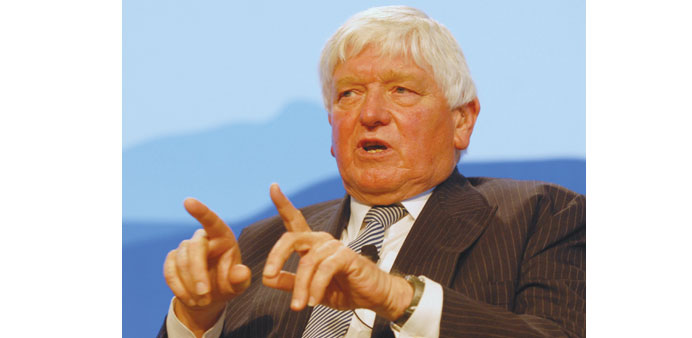Flanagan retired in 2013 as executive vice-chairman of Emirates.
Bloomberg/New York
Maurice Flanagan, Emirates airline’s British-born founding chief executive who built the company into the world’s largest international airline, has died. He was 86.
He died on Thursday at his home in London, the Dubai-based carrier said in a statement. He died of natural causes, Valerie Tan, a spokeswoman for Emirates Group, said in an e-mail.
Flanagan, a veteran British Airways executive, led a 10-man team that started Emirates in 1985 with $10mn and two rented planes. He retired in 2013 as executive vice-chairman of state-owned Emirates Group.
The airline that Flanagan created became known for opulent service and aggressive expansion. It was the first carrier to offer first-class travellers private onboard mini-suites, with dining tables and “massage enabled” leather chairs, Newsweek said in 2006. Emirates was an early adopter of the latest aircraft and seatback entertainment screens.
After ranking 24th among international airlines by passenger traffic in 2000, Emirates overtook Germany’s Lufthansa as the world leader in 2009.
“Maurice was a man of great character, and a legend in the aviation industry,” Sheikh Ahmed bin Saeed al-Maktoum, chairman and chief executive of Emirates Airline and the Emirates Group, said in the statement.
Flanagan, who Forbes Global described in 2002 as having “aviation fuel running through his veins,” was often called to rebut charges by rivals that the company’s success relied on government subsidies.
“When we started in 1985, the rules were quite clear,” he said, according to a 2006 New York Times article. “The sheik said, ‘Here’s $10mn, don’t come back for more.’ We get nothing special.”
Contributing to Emirates’s growth was that it was willing to meet demand for service in troubled parts of the world. It continued to fly during Operation Desert Storm, the first Persian Gulf War, in 1991 when some other airlines suspended operations in the region.
Today, the carrier serves 140 destinations in 80 countries, according to its website. It has a fleet of more than 230 aircraft and is the biggest operator of Boeing Co’s 777, the world’s largest twin-engine aircraft. It also flies the biggest fleet of Airbus Group NV A380 double-decker jetliners, with 60 in use and another 80 on order.
Maurice Flanagan was born on November 17, 1928, in Leigh, England, according to Debrett’s People of Today. His parents were Patrick and Theresa Flanagan.
He received a bachelor’s degree in English and French from the University of Liverpool.
While serving as a navigator in the Royal Air Force from 1951 to 1952, he took a fall that injured his knee, preventing him from pursuing a career as a professional soccer player, he said, according to a profile in the Age, a Melbourne, Australia, newspaper.
Instead, Flanagan joined BOAC, predecessor to British Airways, in 1953 and worked in overseas postings. He became route planning manager in 1965.
“There is something about the airline industry that really grabbed me,” he said in the Age interview.
In 1978, Flanagan moved to Dubai to run Dnata, the state travel services company. Speaking in Dubai last February, Flanagan recalled that at the time the city lacked highways and skyscrapers.
“Even then you could taste the dynamism in the air,” he said, according to the Emirates News Agency.
The fledgling airline’s first destinations were Karachi, Pakistan, and Mumbai.
Describing the carrier’s growth, Flanagan pointed to the location of its Dubai base. The emirate is “perfectly located to be the global hub of this century,” he told the Times.
A jovial presence in interviews, Flanagan professed to being the “oldest and deafest” of his airline executive peers, in the Times interview. During his RAF service, he said, wearing hearing protection marked one as a “sissy.”
At Emirates, Flanagan redirected his interest in soccer to make the airline a sponsor of London’s Arsenal team. In 2004, the company agreed to pay £100mn ($154mn) for the naming rights of the club’s stadium and placement of the carrier’s logo on jerseys through 2021.
In 2000, Flanagan was made a Commander of the British Empire. In 2010 he was appointed Knight Commander of the Order of the British Empire.
His survivors include his wife, Audrey Bolton; son Julian; and daughters Siobhan and Claire, according to the statement.

